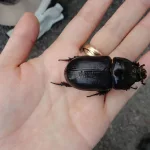Yesterday, the Hawaiʻi Department of Agriculture announced record funding for biosecurity measures approved by the state Legislature that will expand the state’s efforts to stop the spread of invasive species such as little fire ants, the coconut rhinoceros beetle and coqui frogs.
The funding was made possible by the signing of HB 1800 (Act 230, Session Laws of Hawaiʻi (SLH) 2024), the supplemental budget bill for fiscal year 2025.
Through Act 230, SLH 2024, state general fund appropriations will increase from $6.2 million to $9.2 million.
Biosecurity measures led by HDOA will further the safety of Hawaiʻi’s agricultural, environmental and ecological systems. The measure is supplemented by HB 2619 (Act 231, SLH 2024).
Act 231, SLH 2024, provides $10 million for targeted biosecurity initiatives on invasive species control for the following species:
- Coconut Rhinoceros Beetles
- Equipment (drones), chemicals, nets, community engagement – $1.2 million
- Green waste management – $800,000
- Compost reimbursement – $400,000
- Brown Tree Snakes – $240,000
- Little Fire Ants – $1.5 million
- Coqui Frogs – $74,355
- Two-Lined Spittlebugs – $600,000
- Rose-Ringed Parakeets – $300,000
To bolster the department’s efforts, an additional $670,485 has been appropriated for the hiring of positions created include plant quarantine inspectors, entomologists, plant pathologists, planners, environmental health specialists, noxious weed specialists and other support staff.
The funding will bolster Hawai‘i’s biosecurity infrastructure, enabling the HDOA to implement comprehensive measures to prevent, detect, and respond to invasive species threats more effectively. Key areas of appropriations include:
- Enhanced Inspection and Quarantine Facilities: Significant investments will be made to ensure that inspection and quarantine facilities statewide remain effective, ensuring thorough screening of incoming plants, animals, and agricultural products.
- Personnel for Funding: Funding will support the acquisition and hiring of key personnel, including inspectors, entomologists, and environmental health specialists, to detect, identify, and combat invasive species, minimizing their impact on Hawaiʻi’s environment and agriculture.
- Rapid Response and Eradication Programs: Increased resources will be allocated to rapid response teams, enhancing their capacity to swiftly address and eradicate invasive species outbreaks before they become widespread.
Photo credit: Department of Agriculture
.
